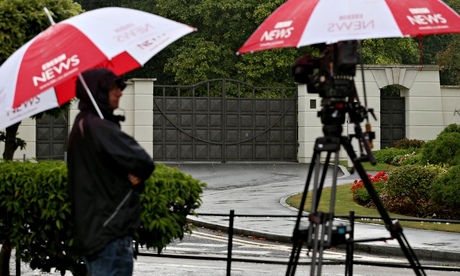
South Yorkshire's police chief has attacked the BBC's "disproportionate" coverage of the search of singer Cliff Richard's house, accusing the corporation of making the raid look "heavy handed and intrusive".
As MPs on the Commons home affairs committee summoned the BBC director general, Tony Hall, to give evidence about the affair, the chief constable of South Yorkshire police, David Crompton, accused the broadcaster of attempting to cover up its role in the search last week.
In a letter to the committee's chairman, Keith Vaz, Crompton said: "The aerial photography used by the BBC was, in my opinion, disproportionate. South Yorkshire police did not encourage the use of a helicopter and actively sought to delay its arrival at the scene. Ultimately the broadcast had the effect of making the house search look heavy handed and intrusive. I recognise this has caused concern and it is for the BBC to justify why it felt its actions were appropriate."
Crompton admitted that his force tipped off the BBC the day before the raid on Richard's £3.5m Berkshire residence but said the decision was taken reluctantly and only to protect the police investigation.
The singer's apartment was searched by officers from South Yorkshire and Thames Valley police as part of an investigation into an alleged sexual assault on a boy at a religious event in 1985. Richard, who was on holiday in Portugal, has firmly denied any wrongdoing.
Vaz said Hall and Crompton had been summoned to give evidence on 2 September: "These are serious matters which deal with the sensitive issue of how the police conduct their investigations. The balance between mass and individual public interest must be struck appropriately and the relationships between the police and the media must always be ethical.
"I am grateful for the information provided. However, it raises even more questions. In his letter, the chief constable accuses the BBC of a 'cover up' which is a matter of deep concern."
Crompton's letter accused the corporation of attempting to "distance itself" from the force's handling of the search with a heavily critical piece by a BBC journalist who described the house search as a "deliberate attempt by the police to ensure maximum coverage". This criticism was made even though the journalist was aware that South Yorkshire police was not the original source of the leak, Crompton said.
He added: "This appeared to be an attempt by the BBC to distance itself from what had taken place and cover up the fact that it had initiated contact with the force about the story. This was misleading and was known by the BBC to be inaccurate."
South Yorkshire police were first contacted about the Richard investigation by a BBC journalist on 14 and 15 July, according to the letter. In telephone calls and a face-to-face meeting, the journalist made clear that the source of his knowledge was from outside South Yorkshire police which, Crompton said, meant the force "believed the source to be credible".
"The information held by the journalist mirrored the information held by my officers in almost every respect," he said, adding that it would have risked compromising the investigation had the journalist published a story.
In a subsequent trade-off, Crompton said the force reluctantly agreed to provide the BBC journalist with a "short period of notice prior to the house search being conducted".
On 13 August, a day before the house search, the force's press office tipped off the journalist at 4.30pm to say the raid would take place the following day. The force appealed to the BBC not to reach the Berkshire location until after officers had arrived for the search "although the aerial photography may have suggested otherwise", Crompton said.
Hall has insisted that BBC journalists "acted appropriately" in its coverage of the story. Mary Hockaday, the head of the BBC's newsroom, said at the Guardian Edinburgh International TV Festival on Friday that the broadcaster had legitimately pursued a major scoop and "did absolutely nothing to jeopardise the police inquiry".
She defended the use of the helicopter, saying it was only used for shots of police cars leaving the property. "Many people, especially papers, have gone much further than we and other broadcasters did after that first day, or day two story," she said. "We reported it accurately. Our coverage was shot through with clear denials."
A BBC spokesman said: "We have set out our position. The story was clearly in the public interest. The police complained specifically about an analysis piece on the BBC website and subsequently, and highly unusually, we confirmed that South Yorkshire Police was not the source of our story."

